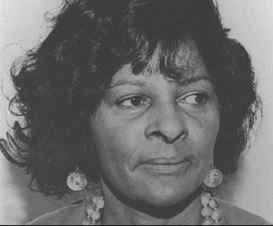Bernice Robinson facts for kids
Bernice Robinson (1914–1994) was an important American activist. She worked hard for civil rights and education. She helped create special schools called "Citizenship Schools" in South Carolina. These schools taught adults how to read and write. This was very important because it helped Black people pass reading tests so they could vote.
Bernice Robinson later became a supervisor for adult education. She led workshops across the southern United States. These workshops taught people reading skills. This helped many Black Americans register to vote. She also ran for political office in South Carolina. She was the first African American woman to do so in the state.
Contents
Early Life and Education
Bernice Violanthe Robinson was born on February 7, 1914. Her hometown was Charleston, South Carolina. She was the youngest of nine children. Her mother was a seamstress, and her father was a bricklayer.
Bernice went to segregated schools. She finished the ninth grade. At that time, this was the highest education allowed for African Americans in her area. In 1929, she moved to Harlem, New York. She lived with her older sister there. She finished high school at the Wadleigh High School for Girls. Bernice dreamed of studying music. However, she returned to Charleston in 1936.
Starting Her Career
When Bernice returned to New York, she found work. She was a seamstress during the day. At night, she studied cosmetology. Eventually, she opened her own beauty salon. She enjoyed being her own boss.
Her beauty shop became a popular meeting place. Neighbors, politicians, and activists would gather there. This is where Bernice first became involved in politics. She registered to vote and helped a local assemblyman. In 1945, she also took real estate courses.
Activism and Citizenship Schools
In 1947, Bernice returned to Charleston. She needed to care for her aging parents. She opened another beauty shop. She also joined the local NAACP branch. She worked as a secretary and helped get new members.
Bernice used her beauty shop for her activism. It was a safe place for people to meet. Clients could even have mail sent to the shop. This helped keep their private business secret.
In 1955, Bernice attended a workshop. It was about ending school segregation. This meeting inspired her. She learned about the problem of illiteracy. She realized that many people couldn't vote because they couldn't read.
Her cousin, Septima Clark, and Esau Jenkins had an idea. They wanted to start an education program. They convinced Bernice to lead it. They believed she was perfect because she wasn't a formal teacher. This meant she would have new ideas. Beauticians were also respected in the community. They were good listeners and self-employed. Bernice also knew some Gullah. This was a local language spoken on the island.
Teaching Adults to Vote
Bernice had a short training at the Highlander Research and Education Center. She learned about basic human rights. On January 7, 1957, she held her first class. She taught adults practical reading skills. They learned to read labels, fill out forms, and read newspapers.
After three months, the final test was simple. Students had to register to vote. An amazing 80% of her students passed! These schools became known as "Citizenship Schools." They spread across the southern United States. The program later moved to the Southern Christian Leadership Conference (SCLC).
Bernice continued to volunteer as a teacher. She also trained other teachers. She taught classes in many states. These included Alabama, Louisiana, Mississippi, and Tennessee. She became the supervisor for the Low Country Citizenship Schools. In the late 1960s, she took more courses. She studied community development and interior design.
Later Work and Legacy
In 1970, Bernice left the SCLC. She started working for the South Carolina Commission for Farm Workers. She supervised volunteers who helped communities. This work focused on creating day care centers. These centers helped children on islands like Edisto Island, Johns Island, and Wadmalaw Island.
Bernice ran for the state House of Representatives in 1972 and 1974. She did not win, but she made history. She was the first African American woman to run for public office in South Carolina. In 1975, she returned to her work with farm workers. She directed programs for migrant workers' day care. She retired in 1982.
Bernice Robinson passed away on September 3, 1994, in Charleston, South Carolina. Her work helped countless people. She made it possible for many to learn to read and vote. Her personal papers are kept at the Avery Research Center. This center is at the College of Charleston. Her legacy shows how one person can make a huge difference.
 | Jackie Robinson |
 | Jack Johnson |
 | Althea Gibson |
 | Arthur Ashe |
 | Muhammad Ali |


